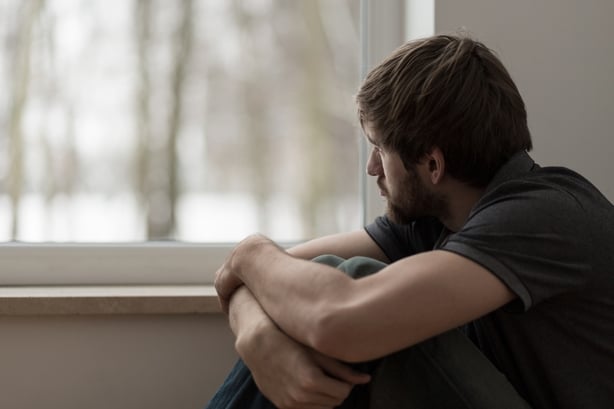Niamh Delmar is a Counselling Psychologist and Mental Health Freelance writer. Here, she shares her advice for coping with depression in a pandemic Christmas.
Not everyone is in the mood to celebrate. Some people experience an amplification or relapse of depression this time of the year. The DSM-5 diagnostic definition includes having a depressed mood most of the day every day and anhedonia (no pleasure or interest in things you used to enjoy).
There may be weight changes, feeling worthless or guilty, inability to concentrate or make decisions, fatigue and feeling suicidal. Appetite and sleep may be affected. The criteria ascertains that five or more of the symptoms have to be present for more than two consecutive weeks and daily functioning disturbed.

There are different classifications of depression. Thinking becomes skewed as the individual gets sucked into a negative spiral of thoughts. Many people describe a lack of motivation with even everyday tasks becoming a huge effort. Depression does not always need a trigger, which can make it harder for the person to understand it. It is different to sadness which is an emotion that everyone experiences at different times in life.
Research has found that many of those who suffer with depression report a worsening of symptomatology this time of year. For some, Christmas time exacerbates and overwhelms their psychological system.
A second pandemic Christmas with the announcement of a new variant and restrictions strips another layer off the national psyche, leaving those vulnerable more mentally exposed. According to Psychiatrist Brendan Kelly of Trinity College and Tallaght University Hospital, the impact of Covid-19 and associated restrictions has increased psychological distress, including depression, in this country.
Psychiatrists surveyed in 2020 reported a 57% increase in referrals for those diagnosed with depression. It is most significant among those with pre-existing illness and among Health care workers. The Covid trajectory is uncertain and unpredictable, which is a precarious environment for healthy mood. It is not just a physical condition. Studies have revealed that over half of patients hospitalised with COVID-19 were diagnosed with depression one year later.

The ways in which Christmas contributes to depression are multi-faceted. Loss, loneliness and financial worries are intensified this time of year. The stress of having things to do, presents to buy and people to meet can flatten mood.
As the Christmas buzz speeds up, services and supports slow down. Physical conditions affect people more acutely as they yearn to feel well enough to enjoy the period. Extra demands on time, disrupted sleep, expectations of self and others, overindulgence in food, alcohol and or drugs, and tricky family dynamics intensify.
This time of year also brings far less exposure to light this side of the equator, which is linked to seasonal affective disorder (SAD). There is a reported increase in violence within homes this time of year. Prolonged exposure to abuse can contribute to the onset of depressive episodes in all ages.
Whether you are trying to prevent relapse, onset, cope with depression or support a person in distress with depression, there are some strategies that will help:
1. Assess and record your mood every day on a scale 0-10 with 0 being extremely low and 10 being non- depressed. Be aware that thoughts will be depressed too, so they will be negative and distorted. Try not to get sucked into unhealthy and unhelpful thought processes.
2. Focus on what soothes you and what went well, no matter how small. It accumulates. Being in nature has been found to be a boost to a depressed mood. A practice in Japan called Shirin-Yoku, also known as forest bathing, involves immersing yourself in nature and engaging all five senses. Research has found a plethora of its positive benefits for physiological and psychological health, including depression.
Even watching videos of forests or oceans has shown similar effects. If you suspect Seasonal Affective Disorder, discuss with your GP or mental health professional, get outdoors as much as possible during daylight hours and access light therapy.

3. Psycho-education: Inform yourself about depression. Look up reputable sites, such as Aware, the Mayo Clinic, HSE, NHS etc.
4. Reflect on yourself, your lifestyle, relationships, addiction issues, life stressors, lifestyle, losses and other contributing factors that may be at play. Healthy boundaries will protect your mood from conflict or difficult dynamics. Step back physically and emotionally.
5. Ask yourself if your expectations are realistic and reasonable of yourself and of others. You can't expect the same of yourself if you are grieving or unwell. Take the pressure off yourself. Having a competitive Christmas will drain you. Avoid social comparisons. A picture on social media does not tell a thousand words. Try not to listen to your inner critic or the harsh taskmaster.
6. Reduce your to do lists and delegate if you can.

7. Christmas in a pandemic is unpredictable. Depression peaks and troughs throughout the week. We need to try to live day by day. Make 'loose, play it by ear’ plans.
8. If loneliness features, try to reach out and ask for what you need. For example, saying to a friend "I am really struggling. I could really do with a walk when suits you"
Read more: A psychologist's guide to coping with isolation and loneliness
9. You are not alone in your struggle. Others are suffering around the world and there are ways to get through this. Support groups, such as those run by Aware, offer positive connections.
10. Set daily routines to anchor you throughout the day. It is the small steps that bring you forward from one hour to the next. A shower, breakfast, a few chores, a walk, some meditation, meeting someone, cleaning and engaging in healthy distractions for the mind such as reading or learning, the body (some form of movement) and creativity (writing, painting or music). A sense of achievement spurs you on.

11. If you have some reserves, help others. If financially okay, you could donate or give to a loved one. If up to it, you could volunteer. Studies show that helping others and making a positive difference in someone’s life can provide some relief to a depressed mood.
12. Bring some fun and lightness into your day such as comedy clips, funny movies, uplifting music or a light book. Even if you don’t feel like it, light relief reduces negative thinking.
13. When depressed your neurotransmitters in the brain, such as norepinephrine, dopamine and serotonin, are reduced. If the mood is unbearable and intruding on your daily functioning, chat with your GP and a mental health professional. Assessment and treatment is individual as people have different backgrounds, life events, environments, personalities and symptomatology.
14. Show compassion and understanding towards yourself.

Resources:
- Aware helpline Freephone 1800804848 www.aware.ie
- The Samaritans helpline Freephone 116123 www.samartitans.org
- Women’s Aid helpline Freephone 1800341900 www.womensaid.ie
- Pieta House Freephone 1800247247 www.pieta.ie
- SpunOut.ie for 16-25 year olds www.spunout.ie
- A Lust for life www.alustforlife.ie

